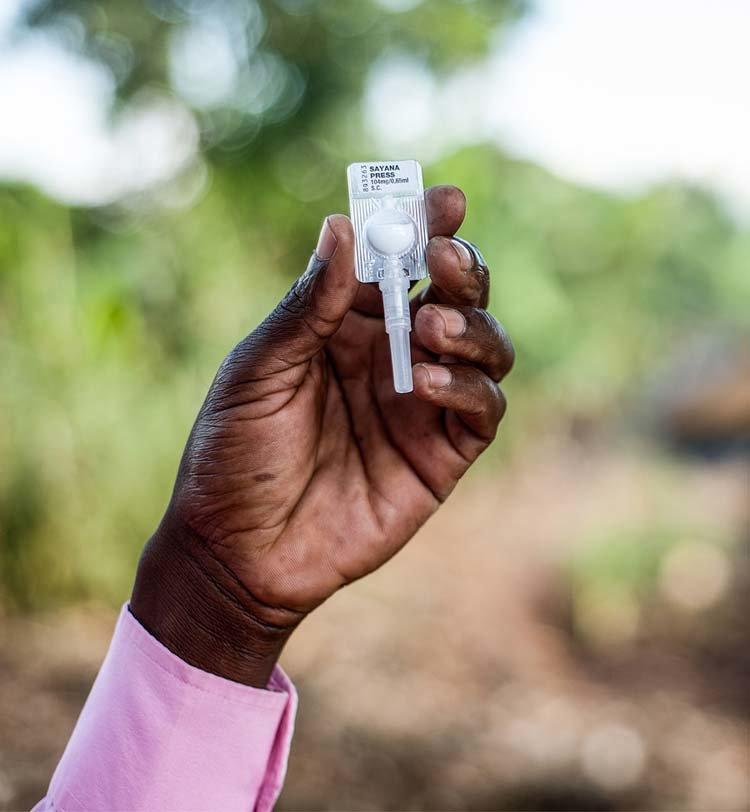
On July 13, 2020, Kenya’s Department of Family Health approved a new national training package for pharmacists and pharmaceutical technologists that includes subcutaneous and intramuscular DMPA (DMPA-SC and DMPA-IM). The comprehensive curriculum integrates family planning, HIV, sexually transmitted infections, and other related services. Printing began in September 2020 and plans for roll out are underway.
According to the 2014 Kenya Demographic and Health Survey, one in ten family planning clients obtained their method of choice from pharmacies [1]. However, prior to 2018, pharmacists and pharmaceutical technologists could only provide condoms and pills. Pharmacists needed to refer clients who opted for injectable contraceptives to other providers, despite WHO guidelines recommending that pharmacists could do so safely and effectively when trained [2].
Advance Family Planning (AFP) local partner Jhpiego advocated alongside like-minded organizations for more than three years to engage decision-makers to support the policy change. On October 9, 2018, Kenya’s Ministry of Health amended its family planning guidelines to allow pharmacists and pharmaceutical technologists throughout the country to provide contraceptive injectables.
But before they could start offering the methods, pharmacists and pharmaceutical technologists needed in-service training on how to administer them. In April 2019, Jhpiego led advocacy efforts to engage the Ministry of Health on next steps.
On April 24, 2019, the family planning manager at the Ministry of Health (MOH) formed a team to develop a plan for implementing the new policy provision, including the development of a training package. The team included officers from the MOH, the Pharmacy and Poisons Board, the Pharmaceutical Society of Kenya, Kenya Pharmaceutical Association, Kenya Medical Supplies Agency, and County Pharmacists. It also included implementing NGOs and stakeholders such as John Snow, Inc. (Access Collaborative), Clinton Health Access Initiative, UNFPA, Population Services Kenya, Marie Stopes Kenya, Health Strat, DKT, Bayer, Pfizer, and Jhpiego.
Following the completion of the implementation plan in April 2019, the team embarked on the training package. Sometimes referred to as a curriculum, the package comprises a trainer’s manual, participant manual, and a participant logbook, in which a trainee logs all procedures for certification.
Core competencies covered in the package include counseling for family planning, medical eligibility criteria, service integration and referrals, contraceptive methods, pharmacovigilance, and infection prevention and control. It also covers anatomy and physiology of the human reproductive system, reproductive health commodity management, and family planning documentation and reporting. The package clearly outlines issues of accreditation for pharmacy outlets and the certification of trainees. Once trained, pharmacists will be able to orient clients on self-injection of DMPA as part of an implementation science initiative.
The training package was pretested with a group of 15 pharmacists selected as a national trainer of trainers effort. The pretest was completed on August 16 and validated on December 20 at meetings convened by the Ministry of Health. The experience and inputs from the two meetings were used to refine the training package.
Once a training package is validated, the next step is official Ministry of Health sign-off. Unfortunately, this did not happen as anticipated. Among other key players, the MOH program manager leading the training package development and the head of the Department of Family Health transitioned. Their replacements needed to be brought on board.
Nearly six months passed with little progress. On June 23, 2020, AFP partner Jhpiego mobilized a few champions within and outside MOH to provide a briefing to the new head of family health and make a case for sign off. The champions included former MOH family planning managers who had worked on the training package, the CEO of the Pharmaceutical Society of Kenya (who is also PATH’s Access Collaborative Ambassador), the director of training at the Pharmacy and Poisons Board, and the CEO of the Urban Research and Development Centre for Africa. The meeting was also attended by the head of the MOH’s Division of Reproductive and Maternal Health Services.
Following this meeting, Dr. Isaak Bashir, Head of the Department of Family Health, asked Jhpiego to provide him with hard-copy documents that confirmed prior MOH approval for pharmacists to provide injectable contraceptives. Jhpiego was also asked to respond to how quality standards will be addressed.
Jhpiego held a meeting with Dr. Bashir on July 2 to provide the necessary information. On July 13, Dr. Bashir signed off the training package.
Following this milestone, Jhpiego engaged with the new MOH family planning program manager to ask for the establishment of a training coordination committee. It was established on August 13. The family planning training coordination committee for pharmacists and pharmaceutical technologists is co-chaired by the MOH and Pharmacy and Poisons Board. The Pharmaceutical Society of Kenya, which has been a key ally in the development of the training package, serves as the secretariat.
The training coordination committee established two subcommittees—the workplan and reporting sub-committees. As a next step, the workplan subcommittee will update the implementation plan jointly with stakeholders to begin rolling out the trainings. The reporting subcommittee is consulting with the relevant MOH department on how pharmacy outlets will be able to report family planning services on the national information platform. AFP partner Jhpiego will work with key stakeholders to advocate for introduction of injectable contraceptives in the pharmacy pre-service curriculum.
References
- Kenya Demographic and Health Survey 2014. Kenya National Bureau of Statistics, Ministry of Health/Kenya, National AIDS Control Council/Kenya, Kenya Medical Research Institute, National Council for Population and Development/Kenya, and ICF International.
- WHO. 2017. Task Sharing to Improve Access to Family Planning/Contraception. Geneva: WHO.

